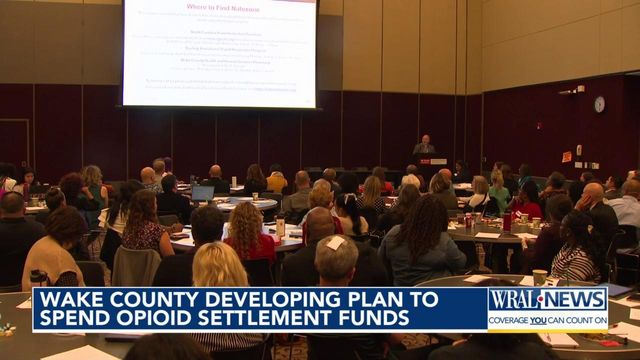Wake County gets $65 million to fight opioid crisis: How to spend the money?
Families who lost loved ones to opioids are helping Wake County plan how to spend millions of dollars to prevent more deaths.
According to Wake County, 219 people died from overdoses in the county in 2022, the last full year of recorded data. That's one person every 40 hours.
Data from the Raleigh Police Department shows 103 of those deaths -- nearly half -- occurred in Raleigh, making 2022 the city's most deadly year on record since police began tracking drug overdoses in 2015.
Over the next 18 years, Wake County will receive $65 million as part of a $50 billion nationwide settlement that forces drugmakers and distributors to pay for their part in the opioid epidemic.
On Friday, Wake County leaders asked for the community's input on how to best use the money.
Wake County's Opioid Settlement Community met Friday inside the McKimmon Center at North Carolina State University. The committee brought together more than 100 people, including families who've lost loved ones to the opioid crisis.
Cheryl Stallings, a Wake County commissioner, said the county has already received about $4.85 million.
"This is significant, and this is historical," Stallings said. "We really want to use these funds wisely, and we think one of the best ways to do that is to plan with as many people as involved as how we want to use those funds moving forward."
The funds have helped expand treatment for people with opioid use disorder and provided resources for survivors of an overdose.
Now, Wake County must create a plan to spend more settlement funds over the next two years.
"We have these funds that can actually do something in stopping that trend and building an infrastructure of health and well being for our community moving forward," Stallings said.
Cary resident Barb Walsh said moving forward is how she honors her daughter, Sophia, who died of fentanyl poisoning in 2021.
"She stopped at an acquaintance’s house and grabbed a bottle of water, and in that bottle of water was diluted fentanyl," Walsh said.
Walsh now runs the nonprofit Fentanyl Victims Network of North Carolina to help shape the response to the opioid crisis in Wake County.
"These folks are compassionate," Walsh said. "They’re committed to saving lives, and so am I."
Walsh said she hopes there can be easier access to the drugs Naloxone or Narcan, which can reverse an opioid overdose.
Wake County is currently trying to expand where people can get the life-saving drugs, including working with the Wake County Public School System to make Narcan available on all campuses.












